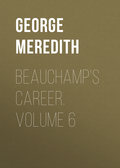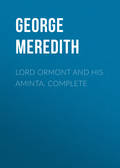
George Meredith
Rhoda Fleming. Complete
“Ay, and the beer, such as it is.” The farmer drank and sighed.
Anthony tried the beer, remarking, “That’s good beer; it don’t cost much.”
“It ain’t adulterated. By what I read of your London beer, this stuff’s not so bad, if you bear in mind it’s pure. Pure’s my motto. ‘Pure, though poor!’”
“Up there, you pay for rank poison,” said Anthony. “So, what do I do? I drink water and thank ‘em, that’s wise.”
“Saves stomach and purse.” The farmer put a little stress on ‘purse.’
“Yes, I calculate I save threepence a day in beer alone,” said Anthony.
“Three times seven’s twenty-one, ain’t it?”
Mr. Fleming said this, and let out his elbow in a small perplexity, as Anthony took him up: “And fifty-two times twenty-one?”
“Well, that’s, that’s—how much is that, Mas’ Gammon?” the farmer asked in a bellow.
Master Gammon was laboriously and steadily engaged in tightening himself with dumpling. He relaxed his exertions sufficiently to take this new burden on his brain, and immediately cast it off.
“Ah never thinks when I feeds—Ah was al’ays a bad hand at ‘counts. Gi’es it up.”
“Why, you’re like a horse that never was rode! Try again, old man,” said the farmer.
“If I drags a cart,” Master Gammon replied, “that ain’t no reason why I should leap a gate.”
The farmer felt that he was worsted as regarded the illustration, and with a bit of the boy’s fear of the pedagogue, he fought Anthony off by still pressing the arithmetical problem upon Master Gammon; until the old man, goaded to exasperation, rolled out thunderingly,—
“If I works fer ye, that ain’t no reason why I should think fer ye,” which caused him to be left in peace.
“Eh, Robert?” the farmer transferred the question; “Come! what is it?”
Robert begged a minute’s delay, while Anthony watched him with hawk eyes.
“I tell you what it is—it’s pounds,” said Robert.
This tickled Anthony, who let him escape, crying: “Capital! Pounds it is in your pocket, sir, and you hit that neatly, I will say. Let it be five. You out with your five at interest, compound interest; soon comes another five; treat it the same: in ten years—eh? and then you get into figures; you swim in figures!”
“I should think you did!” said the farmer, winking slyly.
Anthony caught the smile, hesitated and looked shrewd, and then covered his confusion by holding his plate to Mrs. Sumfit for a help. The manifest evasion and mute declaration that dumpling said “mum” on that head, gave the farmer a quiet glow.
“When you are ready to tell me all about my darlin’, sir,” Mrs. Sumfit suggested, coaxingly.
“After dinner, mother—after dinner,” said the farmer.
“And we’re waitin’, are we, till them dumplings is finished?” she exclaimed, piteously, with a glance at Master Gammon’s plate.
“After dinner we’ll have a talk, mother.”
Mrs. Sumfit feared from this delay that there was queer news to be told of Dahlia’s temper; but she longed for the narrative no whit the less, and again cast a sad eye on the leisurely proceedings of Master Gammon. The veteran was still calmly tightening. His fork was on end, with a vast mouthful impaled on the prongs. Master Gammon, a thoughtful eater, was always last at the meal, and a latent, deep-lying irritation at Mrs. Sumfit for her fidgetiness, day after day, toward the finish of the dish, added a relish to his engulfing of the monstrous morsel. He looked at her steadily, like an ox of the fields, and consumed it, and then holding his plate out, in a remorseless way, said, “You make ‘em so good, marm.”
Mrs. Sumfit, fretted as she was, was not impervious to the sound sense of the remark, as well as to the compliment.
“I don’t want to hurry you, Mas’ Gammon,” she said; “Lord knows, I like to see you and everybody eat his full and be thankful; but, all about my Dahly waitin’,—I feel pricked wi’ a pin all over, I do; and there’s my blessed in London,” she answered, “and we knowin’ nothin’ of her, and one close by to tell me! I never did feel what slow things dumplin’s was, afore now!”
The kettle simmered gently on the hob. Every other knife and fork was silent; so was every tongue. Master Gammon ate and the kettle hummed. Twice Mrs. Sumfit sounded a despairing, “Oh, deary me!” but it was useless. No human power had ever yet driven Master Gammon to a demonstration of haste or to any acceleration of the pace he had chosen for himself. At last, she was not to be restrained from crying out, almost tearfully,—
“When do you think you’ll have done, Mas’ Gammon?”
Thus pointedly addressed, Master Gammon laid down his knife and fork. He half raised his ponderous, curtaining eyelids, and replied,—
“When I feels my buttons, marm.”
After which he deliberately fell to work again.
Mrs. Sumfit dropped back in her chair as from a blow.
But even dumplings, though they resist so doggedly for a space, do ultimately submit to the majestic march of Time, and move. Master Gammon cleared his plate. There stood in the dish still half a dumpling. The farmer and Rhoda, deeming that there had been a show of inhospitality, pressed him to make away with this forlorn remainder.
The vindictive old man, who was as tight as dumpling and buttons could make him, refused it in a drooping tone, and went forth, looking at none. Mrs. Sumfit turned to all parties, and begged them to say what more, to please Master Gammon, she could have done? When Anthony was ready to speak of her Dahlia, she obtruded this question in utter dolefulness. Robert was kindly asked by the farmer to take a pipe among them. Rhoda put a chair for him, but he thanked them both, and said he could not neglect some work to be done in the fields. She thought that he feared pain from hearing Dahlia’s name, and followed him with her eyes commiseratingly.
“Does that young fellow attend to business?” said Anthony.
The farmer praised Robert as a rare hand, but one affected with bees in his nightcap,—who had ideas of his own about farming, and was obstinate with them; “pays you due respect, but’s got a notion as how his way of thinking’s better ‘n his seniors. It’s the style now with all young folks. Makes a butt of old Mas’ Gammon; laughs at the old man. It ain’t respectful t’ age, I say. Gammon don’t understand nothing about new feeds for sheep, and dam nonsense about growing such things as melons, fiddle-faddle, for ‘em. Robert’s a beginner. What he knows, I taught the young fellow. Then, my question is, where’s his ideas come from, if they’re contrary to mine? If they’re contrary to mine, they’re contrary to my teaching. Well, then, what are they worth? He can’t see that. He’s a good one at work—I’ll say so much for him.”
Old Anthony gave Rhoda a pat on the shoulder.
CHAPTER III
“Pipes in the middle of the day’s regular revelry,” ejaculated Anthony, whose way of holding the curved pipe-stem displayed a mind bent on reckless enjoyment, and said as much as a label issuing from his mouth, like a figure in a comic woodcut of the old style:—“that’s,” he pursued, “that’s if you haven’t got to look up at the clock every two minutes, as if the devil was after you. But, sitting here, you know, the afternoon’s a long evening; nobody’s your master. You can on wi’ your slippers, up wi’ your legs, talk, or go for’ard, counting, twicing, and three-timesing; by George! I should take to drinking beer if I had my afternoons to myself in the city, just for the sake of sitting and doing sums in a tap-room; if it’s a big tap-room, with pew sort o’ places, and dark red curtains, a fire, and a smell of sawdust; ale, and tobacco, and a boy going by outside whistling a tune of the day. Somebody comes in. ‘Ah, there’s an idle old chap,’ he says to himself, (meaning me), and where, I should like to ask him, ‘d his head be if he sat there dividing two hundred and fifty thousand by forty-five and a half!”
The farmer nodded encouragingly. He thought it not improbable that a short operation with these numbers would give the sum in Anthony’s possession, the exact calculation of his secret hoard, and he set to work to stamp them on his brain, which rendered him absent in manner, while Mrs. Sumfit mixed liquor with hot water, and pushed at his knee, doubling in her enduring lips, and lengthening her eyes to aim a side-glance of reprehension at Anthony’s wandering loquacity.
Rhoda could bear it no more.
“Now let me hear of my sister, uncle,” she said.
“I’ll tell you what,” Anthony responded, “she hasn’t got such a pretty sort of a sweet blackbirdy voice as you’ve got.”
The girl blushed scarlet.
“Oh, she can mount them colours, too,” said Anthony.
His way of speaking of Dahlia indicated that he and she had enough of one another; but of the peculiar object of his extraordinary visit not even the farmer had received a hint. Mrs. Sumfit ventured to think aloud that his grog was not stiff enough, but he took a gulp under her eyes, and smacked his lips after it in a most convincing manner.
“Ah! that stuff wouldn’t do for me in London, half-holiday or no half-holiday,” said Anthony.
“Why not?” the farmer asked.
“I should be speculating—deep—couldn’t hold myself in: Mexicans, Peroovians, Venzeshoolians, Spaniards, at ‘em I should go. I see bonds in all sorts of colours, Spaniards in black and white, Peruvians—orange, Mexicans—red as the British army. Well, it’s just my whim. If I like red, I go at red. I ain’t a bit of reason. What’s more, I never speculate.”
“Why, that’s safest, brother Tony,” said the farmer.
“And safe’s my game—always was, always will be! Do you think”—Anthony sucked his grog to the sugar-dregs, till the spoon settled on his nose—“do you think I should hold the position I do hold, be trusted as I am trusted? Ah! you don’t know much about that. Should I have money placed in my hands, do you think—and it’s thousands at a time, gold, and notes, and cheques—if I was a risky chap? I’m known to be thoroughly respectable. Five and forty years I’ve been in Boyne’s Bank, and thank ye, ma’am, grog don’t do no harm down here. And I will take another glass. ‘When the heart of a man!’—but I’m no singer.”
Mrs. Sumfit simpered, “Hem; it’s the heart of a woman, too: and she have one, and it’s dying to hear of her darlin’ blessed in town, and of who cuts her hair, and where she gets her gownds, and whose pills—”
The farmer interrupted her irritably.
“Divide a couple o’ hundred thousand and more by forty-five and a half,” he said. “Do wait, mother; all in good time. Forty-five and a-half, brother Tony; that was your sum—ah!—you mentioned it some time back—half of what? Is that half a fraction, as they call it? I haven’t forgot fractions, and logareems, and practice, and so on to algebrae, where it always seems to me to blow hard, for, whizz goes my head in a jiffy, as soon as I’ve mounted the ladder to look into that country. How ‘bout that forty-five and a half, brother Tony, if you don’t mind condescending to explain?”
“Forty-five and a half?” muttered Anthony, mystified.
“Oh, never mind, you know, if you don’t like to say, brother Tony.” The farmer touched him up with his pipe-stem.
“Five and a half,” Anthony speculated. “That’s a fraction you got hold of, brother William John,—I remember the parson calling out those names at your wedding: ‘I, William John, take thee, Susan;’ yes, that’s a fraction, but what’s the good of it?”
“What I mean is, it ain’t forty-five and half of forty-five. Half of one, eh? That’s identical with a fraction. One—a stroke—and two under it.”
“You’ve got it correct,” Anthony assented.
“How many thousand divide it by?”
“Divide what by, brother William John? I’m beat.”
“Ah! out comes the keys: lockup everything; it’s time!” the farmer laughed, rather proud of his brother-in-law’s perfect wakefulness after two stiff tumblers. He saw that Anthony was determined with all due friendly feeling to let no one know the sum in his possession.
“If it’s four o’clock, it is time to lock up,” said Anthony, “and bang to go the doors, and there’s the money for thieves to dream of—they can’t get a-nigh it, let them dream as they like. What’s the hour, ma’am?”
“Not three, it ain’t,” returned Mrs. Sumfit; “and do be good creatures, and begin about my Dahly, and where she got that Bumptious gownd, and the bonnet with blue flowers lyin’ by on the table: now, do!”
Rhoda coughed.
“And she wears lavender gloves like a lady,” Mrs. Sumfit was continuing.
Rhoda stamped on her foot.
“Oh! cruel!” the comfortable old woman snapped in pain, as she applied her hand to the inconsolable fat foot, and nursed it. “What’s roused ye, you tiger girl? I shan’t be able to get about, I shan’t, and then who’s to cook for ye all? For you’re as ignorant as a raw kitchen wench, and knows nothing.”
“Come, Dody, you’re careless,” the farmer spoke chidingly through Mrs. Sumfit’s lamentations.
“She stops uncle Anthony when he’s just ready, father,” said Rhoda.
“Do you want to know?” Anthony set his small eyes on her: “do you want to know, my dear?” He paused, fingering his glass, and went on: “I, Susan, take thee, William John, and you’ve come of it. Says I to myself, when I hung sheepish by your mother and by your father, my dear, says I to myself, I ain’t a marrying man: and if these two, says I, if any progeny comes to ‘em—to bless them, some people’d say, but I know what life is, and what young ones are—if—where was I? Liquor makes you talk, brother William John, but where’s your ideas? Gone, like hard cash! What I meant was, I felt I might some day come for’ard and help the issue of your wife’s weddin’, and wasn’t such a shady object among you, after all. My pipe’s out.”
Rhoda stood up, and filled the pipe, and lit it in silence. She divined that the old man must be allowed to run on in his own way, and for a long time he rambled, gave a picture of the wedding, and of a robbery of Boyne’s Bank: the firm of Boyne, Burt, Hamble, and Company. At last, he touched on Dahlia.
“What she wants, I can’t make out,” he said; “and what that good lady there, or somebody, made mention of—how she manages to dress as she do! I can understand a little goin’ a great way, if you’re clever in any way; but I’m at my tea”—Anthony laid his hand out as to exhibit a picture. “I ain’t a complaining man, and be young, if you can, I say, and walk about and look at shops; but, I’m at my tea: I come home rather tired there’s the tea-things, sure enough, and tea’s made, and, maybe, there’s a shrimp or two; she attends to your creature comforts. When everything’s locked up and tight and right, I’m gay, and ask for a bit of society: well, I’m at my tea: I hear her foot thumping up and down her bed-room overhead: I know the meaning of that: I’d rather hear nothing: down she runs: I’m at my tea, and in she bursts.”—Here followed a dramatic account of Dahlia’s manner of provocation, which was closed by the extinction of his pipe.
The farmer, while his mind still hung about thousands of pounds and a certain incomprehensible division of them to produce a distinct intelligible total, and set before him the sum of Anthony’s riches, could see that his elder daughter was behaving flightily and neglecting the true interests of the family, and he was chagrined. But Anthony, before he entered the house, had assured him that Dahlia was well, and that nothing was wrong with her. So he looked at Mrs. Sumfit, who now took upon herself to plead for Dahlia: a young thing, and such a handsome creature! and we were all young some time or other; and would heaven have mercy on us, if we were hard upon the young, do you think? The motto of a truly religious man said, try ‘em again. And, maybe, people had been a little hard upon Dahlia, and the girl was apt to take offence. In conclusion, she appealed to Rhoda to speak up for her sister. Rhoda sat in quiet reserve.
She was sure her sister must be justified in all she did but the picture of the old man coming from his work every night to take his tea quite alone made her sad. She found herself unable to speak, and as she did not, Mrs. Sumfit had an acute twinge from her recently trodden foot, and called her some bitter names; which was not an unusual case, for the kind old woman could be querulous, and belonged to the list of those whose hearts are as scales, so that they love not one person devotedly without a corresponding spirit of opposition to another. Rhoda merely smiled.
By-and-by, the women left the two men alone.
Anthony turned and struck the farmer’s knee.
“You’ve got a jewel in that gal, brother William John.”
“Eh! she’s a good enough lass. Not much of a manager, brother Tony. Too much of a thinker, I reckon. She’s got a temper of her own too. I’m a bit hurt, brother Tony, about that other girl. She must leave London, if she don’t alter. It’s flightiness; that’s all. You mustn’t think ill of poor Dahly. She was always the pretty one, and when they know it, they act up to it: she was her mother’s favourite.”
“Ah! poor Susan! an upright woman before the Lord.”
“She was,” said the farmer, bowing his head.
“And a good wife,” Anthony interjected.
“None better—never a better; and I wish she was living to look after her girls.”
“I came through the churchyard, hard by,” said Anthony; “and I read that writing on her tombstone. It went like a choke in my throat. The first person I saw next was her child, this young gal you call Rhoda; and, thinks I to myself, you might ask me, I’d do anything for ye—that I could, of course.”
The farmer’s eye had lit up, but became overshadowed by the characteristic reservation.
“Nobody’d ask you to do more than you could,” he remarked, rather coldly.
“It’ll never be much,” sighed Anthony.
“Well, the world’s nothing, if you come to look at it close,” the farmer adopted a similar tone.
“What’s money!” said Anthony.
The farmer immediately resumed his this-worldliness:
“Well, it’s fine to go about asking us poor devils to answer ye that,” he said, and chuckled, conceiving that he had nailed Anthony down to a partial confession of his ownership of some worldly goods.
“What do you call having money?” observed the latter, clearly in the trap. “Fifty thousand?”
“Whew!” went the farmer, as at a big draught of powerful stuff.
“Ten thousand?”
Mr. Fleming took this second gulp almost contemptuously, but still kindly.
“Come,” quoth Anthony, “ten thousand’s not so mean, you know. You’re a gentleman on ten thousand. So, on five. I’ll tell ye, many a gentleman’d be glad to own it. Lor’ bless you! But, you know nothing of the world, brother William John. Some of ‘em haven’t one—ain’t so rich as you!”
“Or you, brother Tony?” The farmer made a grasp at his will-o’-the-wisp.
“Oh! me!” Anthony sniggered. “I’m a scraper of odds and ends. I pick up things in the gutter. Mind you, those Jews ain’t such fools, though a curse is on ‘em, to wander forth. They know the meaning of the multiplication table. They can turn fractions into whole numbers. No; I’m not to be compared to gentlemen. My property’s my respectability. I said that at the beginning, and I say it now. But, I’ll tell you what, brother William John, it’s an emotion when you’ve got bags of thousands of pounds in your arms.”
Ordinarily, the farmer was a sensible man, as straight on the level of dull intelligence as other men; but so credulous was he in regard to the riches possessed by his wife’s brother, that a very little tempted him to childish exaggeration of the probable amount. Now that Anthony himself furnished the incitement, he was quite lifted from the earth. He had, besides, taken more of the strong mixture than he was ever accustomed to take in the middle of the day; and as it seemed to him that Anthony was really about to be seduced into a particular statement of the extent of the property which formed his respectability (as Anthony had chosen to put it), he got up a little game in his head by guessing how much the amount might positively be, so that he could subsequently compare his shrewd reckoning with the avowed fact. He tamed his wild ideas as much as possible; thought over what his wife used to say of Anthony’s saving ways from boyhood, thought of the dark hints of the Funds, of many bold strokes for money made by sagacious persons; of Anthony’s close style of living, and of the lives of celebrated misers; this done, he resolved to make a sure guess, and therefore aimed below the mark.
Money, when the imagination deals with it thus, has no substantial relation to mortal affairs. It is a tricksy thing, distending and contracting as it dances in the mind, like sunlight on the ceiling cast from a morning tea-cup, if a forced simile will aid the conception. The farmer struck on thirty thousand and some odd hundred pounds—outlying debts, or so, excluded—as what Anthony’s will, in all likelihood, would be sworn under: say, thirty thousand, or, safer, say, twenty thousand. Bequeathed—how? To him and to his children. But to the children in reversion after his decease? Or how? In any case, they might make capital marriages; and the farm estate should go to whichever of the two young husbands he liked the best. Farmer Fleming asked not for any life of ease and splendour, though thirty thousand pounds was a fortune; or even twenty thousand. Noblemen have stooped to marry heiresses owning no more than that! The idea of their having done so actually shot across him, and his heart sent up a warm spring of tenderness toward the patient, good, grubbing old fellow, sitting beside him, who had lived and died to enrich and elevate the family. At the same time, he could not refrain from thinking that Anthony, broad-shouldered as he was, though bent, sound on his legs, and well-coloured for a Londoner, would be accepted by any Life Insurance office, at a moderate rate, considering his age. The farmer thought of his own health, and it was with a pang that he fancied himself being probed by the civil-speaking Life Insurance doctor (a gentleman who seems to issue upon us applicants from out the muffled folding doors of Hades; taps us on the chest, once, twice, and forthwith writes down our fateful dates). Probably, Anthony would not have to pay a higher rate of interest than he.
“Are you insured, brother Tony?” the question escaped him.
“No, I ain’t, brother William John;” Anthony went on nodding like an automaton set in motion. “There’s two sides to that. I’m a long-lived man. Long-lived men don’t insure; that is, unless they’re fools. That’s how the Offices thrive.”
“Case of accident?” the farmer suggested.
“Oh! nothing happens to me,” replied Anthony.
The farmer jumped on his legs, and yawned.
“Shall we take a turn in the garden, brother Tony?”
“With all my heart, brother William John.”
The farmer had conscience to be ashamed of the fit of irritable vexation which had seized on him; and it was not till Anthony being asked the date of his birth, had declared himself twelve years his senior, that the farmer felt his speculations to be justified. Anthony was nearly a generation ahead. They walked about, and were seen from the windows touching one another on the shoulder in a brotherly way. When they came back to the women, and tea, the farmer’s mind was cooler, and all his reckonings had gone to mist. He was dejected over his tea.
“What is the matter, father?” said Rhoda.
“I’ll tell you, my dear,” Anthony replied for him. “He’s envying me some one I want to ask me that question when I’m at my tea in London.”






